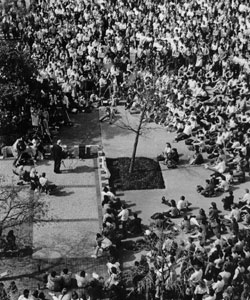YESTER
YEAR
United they stood
Supporters convinced legislators to trumpet the University’s research strengths

At a Feb. 11, 1987, campus rally, President Wendell Nedderman called on legislators to amend the University's role and scope statement to include a research emphasis.
ew events mobilized the campus community like the controversy surrounding UT Arlington’s role and scope more than 20 years ago.
In December 1986 the Select Committee on Higher Education, a group appointed by Gov. Mark White to eliminate program duplication in the state’s 37 public colleges, proposed a role and scope statement that many found objectionable.
The committee recommended that UT Arlington be characterized as a “comprehensive university” with an emphasis on teaching, not research. The proposal shocked faculty and students who feared that such a statement, if adopted, might eliminate research and doctoral programs.
The committee’s characterization of the University of North Texas, Texas Tech University and the University of Houston as emerging national universities with research emphases further stung. Most at UT Arlington considered these to be peer institutions. From the faculty’s perspective, the committee had failed to consider the University’s emergence as a nationally significant research institution.
The proposed change caught UT Arlington administrators off-guard. But once it went public, President Wendell Nedderman took action.
He first worked behind the scenes with UT System administrators to change the statement to recognize the University’s research role. When the committee refused, he and the faculty mobilized student and community support to bring pressure through the Legislature.
State Sen. Bob McFarland took the lead, vowing to block adoption of the Select Committee’s recommendations if the UT Arlington statement was not changed.
“This is an over-my-dead-body situation,” McFarland said bluntly.
Lending political support were the Arlington City Council, Fort Worth Mayor Bob Bolen, state Rep. Kent Grusendorf and Board of Regents Chairman Jess Hay. Dr. Nedderman called an emergency meeting of the faculty and urged them to write letters to legislators. The Faculty Senate and Student Congress also came out strongly in favor of amending the committee’s recommendation.
- from the revised 1987 role and scope statement of the state's Select Committee on Higher Education
On Feb. 11, 1987, Nedderman, threatening a “massive legislative effort,” addressed 3,000 students, faculty and staff at a rally in front of the Central Library. The outpouring of support worked.
A week later, Select Committee Chairman Larry Temple announced that UT Arlington’s role and scope statement had been upgraded to read, in part, “The institution would have the responsibility for achieving excellence in all academic areas—teaching, research, and public service. Research endeavors benefiting the academic strength and national perspectives of the institution and/or addressing the economic needs of the Dallas-Fort Worth Metroplex would be encouraged.”
It was victory and vindication for UT Arlington. After the announcement, McFarland acknowledged that he had received hundreds of letters and phone calls.
“This kind of concern is refreshing,” said McFarland, a UT Arlington Distinguished Alumnus, “because it shows me that there are people out there willing to get involved and support UTA.”
Temple said the committee’s initial recommendation had been misunderstood as being “limiting.” He expressed relief that any misunderstanding was over, and he recognized the University as a “premier research institution.”
Looking back, W.A. Baker, vice president for academic affairs from 1972-93, believes the push to change the statement was just as important as the result.
“It called attention to UTA,” he said. “The effort also had a positive impact internally in that it brought our faculty and staff together.”
— Mark Permenter
Other Stories
Deans named
for School of Urban and Public Affairs, Honors College
Study shows teen victims seek friends' help
United they stood
Supporters convinced legislators to trumpet the University’s research strengths
UT Arlington's new mace
Art meets Academia
Search
Contact Us
Office of University Publications
502 S. Cooper St.279 Fine Arts Building
Box 19647
Arlington, TX 76019-0647
